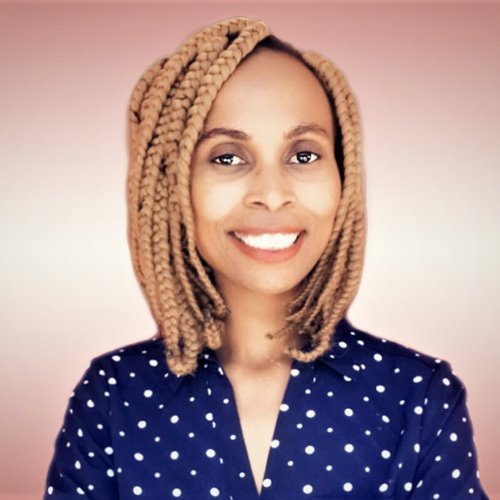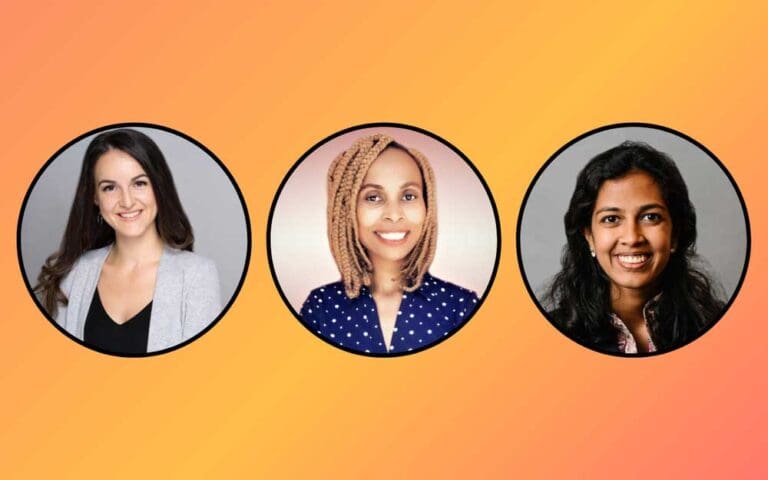A paltry 11% of seed capital in emerging markets goes to companies with a woman in their funding team.
Beyond the social and ethical implications of locking women out of economic opportunities, these inequalities weigh on overall economic performance and limit the innovation we need to tackle big global issues such as climate change and poverty. There’s further evidence that supporting women entrepreneurs is a path to profitability. Despite receiving a fraction of the investment capital granted to their male peers, women-founded companies return twice as much revenue per dollar invested.
The Aurora Tech Awards are an inDrive project to provide recognition and financial support to women founders of IT startups whose projects have had the most profound impact on world development. The process of sifting through nearly 400 applications gave us a front row view of the innovation brewing in emerging markets and the enormous potential that arises when women are empowered and freely able to participate in entrepreneurship. While all of the entrants impressed with their passion and innovation, our top three provide an overview of the opportunities that already exist in emerging markets.
ELIZABETH MWANGI, FOUNDER AND DIRECTOR OF GWIJI FOR WOMEN

Elizabeth is the founder and director of Gwiji, a tech start-up that connects low-income women in some of Kenya’s most impoverished communities to clients in need of cleaning services. Since its launch in May 2022, over 2000 orders have been completed and more than 150 women, usually the main breadwinners in their families, have been connected to over 500 clients.
Elizabeth is a trained architect with a Bachelor’s degree from the University of Nairobi. While studying, she conceived the idea for Gwiji after volunteering with two associations that were empowering women in Nairobi’s deprived communities.
COULD YOU TELL US A BIT MORE ABOUT YOUR STARTUP?
Gwiji is a digital platform that connects casual cleaners in Nairobi, Kenya with clients, aiming to ensure convenience, improve trust, and prevent exploitation for both parties. The app gives economic empowerment to women in Nairobi by helping them access income opportunities.
I started Gwiji in May of 2022 with a $5,000 initial investment by the African Impact Foundation. In our first year, the app was downloaded nearly 500 times, we completed more than 2,000 cleaning orders, and increased cleaners’ average income from $2 to $10 per day.
In the Western world, these numbers may seem modest, but they are life-changing for women living in the slums of Nairobi. Women traditionally care for the children while men work, and so they are dependent on men for income, which can effectively trap women and their children living in difficult conditions. Casual cleaning is an opportunity open to women that doesn’t require any specific skills or education and only takes up a few hours a day, so they can earn an income and then get back home to their children.
Given the opportunity, women can change a whole community. Once we started helping women earn money, we realised that this simple act has a positive impact on the broader society.
DID YOU EVER SIT DOWN AND PLAN YOUR CAREER?
Yes, but the reality is that I’ve seized opportunities as they have arisen.
My parents came from poverty and I have seven siblings, however, they worked hard to break the cycle of poverty and give their children a chance for a better future.
They taught me the value of earning honest money, and I worked gigs to pay for my education.
Before launching Gwiji, I worked on a project called Ajiri Dada, established by Amurt Health Care Center. We went to the slums, and recruited women to work as nurses for the elderly. We taught them how to do household chores and got them jobs in the suburbs. After the project’s funding ran out, I felt that these women had been let down once again. That’s when I had the idea of creating Gwiji – I knew that I wanted to continue helping these women, but in a more sustainable way.
Gwiji received another boost as the first place winner of the 2023 Aurora Tech Award. Prior to that, we had a successful pilot and a service well-received by the market but lacked resources to scale and onboard more women to join the platform. We also identified a need for further training, and so we are establishing a training facility for current cleaners and future recruits where they can learn our code of conduct and ensure they make a positive impression on clients.
We are also introducing our Gwiji Chama financial wellness program to the app, helping women designate their surplus income to be redistributed as loans to other women using Gwiji. Chama is a Swahili word that translates to “Savings Group.”
We are also investing in a call center that helps women who don’t have smartphones access gig work, and also supports our efforts to extend our cleaning services beyond homes into small offices, public institutions such as schools, and events.
WHAT CHALLENGES HAVE YOU FACED ALONG THE WAY AND HOW DID YOU OVERCOME THEM?
I was born and raised in Kaptembwa, a very big slum in Nakuru, Kenya. Large families often live in a tiny single room where children don’t have a place to play and adults lack infrastructure and privacy. Parents need to feed their children but do not have job opportunities, which leads to many committing crimes or turning to prostitution. The slums can be very unsafe, especially at night – even the simple act of leaving the house to use the toilet can put women at risk for assault.
Girls also suffer disproportionately from living in poverty, as they’re more likely to drop out of school.
Daughters see their mothers suffering, and want to earn an income but again, there are few options to do so safely and legally.
When I tell people about my childhood in the slums, I’m often met with sympathy, however, my childhood experiences directly led to the founding of Gwiji. These women are close to my heart and I know how important it is that they are empowered. I want to change the negative stigma of living in slums.
WHAT DO YOU HOPE TO ACHIEVE IN THE FUTURE?
By 2025, I want 10,000 women to be using Gwiji to boost their economic empowerment.
After creating this income opportunity, the next step is to financially educate women so they can more effectively provide for their families. We’ve already begun teaching women about saving their surplus, opening small kiosks where they can sell items such as fruits and vegetables, and becoming entrepreneurs themselves. These conversations include logistics strategies, such as continuing to earn money from kiosks on days they have cleaning jobs by filling in for each other, which helps women diversify their income streams and earn more consistently.
We want Gwiji to expand into a talent powerhouse that helps many other neglected workers in Kenya, such as plumbers, electricians, and other trade workers who need to support their families.
While we don’t currently have the capacity to build commercial structures for all of the people who need us, eventually, Gwiji will help anyone from the slums to find honest work.
DO YOU HAVE ANY ADVICE FOR ANYONE LOOKING TO LAUNCH THEIR OWN STARTUP?
I recently attended an event for the Factor[e] launch of Delta40, a venture studio investing in women and African founders of tech startups that help tackle climate change while boosting income opportunities. U.S. Ambassador to Kenya Meg Whitman was one of the keynote speakers, and she was asked about women-led startups, which typically have less access to capital than startups led by men. It’s been challenging to raise money for Gwiji, so I was interested in the response. According to Whitman, investors invest in ideas and teams, not men or women. Her advice was for women founders to forget they are women.
To me, when applied to the hard work of entrepreneurship, this means coming to terms with certain realities if we are serious about the work we do – the market will give us feedback on our products once we put them out into the world. We must embrace this feedback and tweak the parts that miss the mark, and that is how we develop better products and build successful businesses.
For all women and girls with great business ideas: it’s time to take them to market.
The feedback may be harsh at first, but it will result in a stronger product with a better chance of success.
IVY GUMNISHKA, CEO AND CO-FOUNDER OF HUMANS IN THE LOOP

Iva is Founder and CEO of Humans in the Loop, a social impact focused startup that connects people living in conflict-affected communities to digital work opportunities. To date, the company has created remote employment opportunities for more than 1000 refugees by connecting them with data annotation tasks that help train AI / ML models.
Humans in the Loop also provides educational resources, such as free careers counselling and courses, to refugees around the world. 400 refugees have so far completed these courses, which are designed to aid them in finding employment opportunities in their host countries.
Iva has a Bachelor’s degree in Human Rights from Columbia University. She has been recognised in Forbes’ prestigious 30 under 30 list and the European Young Leaders class of 2023.
COULD YOU TELL US A BIT MORE ABOUT YOUR STARTUP?
Humans in the Loop is a social impact focused startup that connects people living in conflict-affected communities to digital work opportunities. We have designed our service to facilitate two key goals: providing digital employment opportunities to people who need them and providing high-quality annotated data to enable the training of AI and machine learning (ML) models.
Creators of AI / ML models upload un-annotated datasets and create a task asking for this data to be correctly identified and labelled. Humans in the Loop then assigns these tasks to our diverse and distributed workforce who label the data to earn an income.
To date, we have created digital work opportunities for more than 1000 refugees and conflict-affected people in Bulgaria, Ukraine, Turkey, Syria, Iraq, Afghanistan, Yemen, Lebanon, Portugal and Ukraine.
We work with NGOs across the globe to reach refugees, and have a strategy in place to ensure a diverse workforce with an equal number of men and women. Another key aspect of our service is education – we provide free careers counselling and LinkedIn courses to help refugees, be that newly graduated students or experienced professionals, find employment opportunities in their host countries. So far, more than 400 people globally have completed one of our free courses.
DID YOU EVER SIT DOWN AND PLAN YOUR CAREER?
I’ve always had a keen interest in helping improve the lives of some of the most vulnerable people in our global community. I think this interest was initially driven by seeing the experiences of refugees in my home country of Bulgaria.
This passion took me to Columbia University in New York, where I received a Bachelor’s degree in Human Rights.
I suppose I always knew deep down that I wanted to pursue a career where I could make a positive difference to the lives of those who need support the most.
At university, my vision for Humans in the Loop and my focus on supporting refugees began to transform from ideas to solutions, mainly as a result of world events and the devastating refugee crisis emerging from Afghanistan and Syria. Conflicts drive people from their homes and jobs, and place them in an environment where their existing qualifications may not be recognised and their language skills may not be suitable for immediate employment. But everyone needs money to live and support their families, which is why I set up Humans in the Loop to provide remote work that helps people to put a roof over their heads, put food on the table and start rebuilding their lives.
WHAT CHALLENGES HAVE YOU FACED ALONG THE WAY AND HOW DID YOU OVERCOME THEM?
Being a young woman in the world of tech is always challenging, and doubly so when you are striving to go your own way and build your own company in line with your specific vision. You will always encounter a few people who will look down on you and not take you as seriously as they would a man in your position. This is clear from worldwide data that suggests only a tiny fraction of VC funding goes to female founded startups.
However, I have been fortunate so far to surround myself with individuals who respect my leadership and talents, and I have very rarely experienced discrimination. I have also been fortunate to benefit from Bulgaria’s education system, which has had a long-standing focus on STEM subjects. This has cultivated a hospitable environment for women in the Bulgarian tech sector and the country actually has one of the highest rates of female representation in IT across Europe.
Now, we want to see the representation of women working in IT translate to the number of women starting their own businesses.
That’s why I have built a diverse team at Humans in the Loop, to provide more women with exposure to life in an early-stage startup and what it takes to scale a business.
WHAT DO YOU HOPE TO ACHIEVE IN THE FUTURE?
We will continue to scale and bring more remote work opportunities to refugees, allowing them to find a sense of stability and build new lives. We have plans to reinvest our prize money from the Aurora Tech Awards to further develop our technology, building our own platform and enabling us to reach more people.
We have an ongoing pilot project in the Democratic Republic of Congo, are expanding our operations throughout Europe and have plans in the works to launch in a new geography – South-East Asia.
As we scale, we want to make a tangible impact on the lives of refugees across the globe while using their knowledge and work to help build better and more reliable AI / ML systems, an area of technology that is set to revolutionise the world and how we live in it.
DO YOU HAVE ANY ADVICE FOR ANYONE LOOKING TO LAUNCH THEIR OWN STARTUP?
For a young entrepreneur like myself, it is essential to be surrounded by experienced professionals when building a venture. As a founder, you can have the vision and the passion needed to succeed at any age, but the knowledge and expertise required to sustainably build a company takes time to acquire. Founders must ruthlessly inventory their own strengths and weaknesses, so that we can effectively identify and hire people who complement our skill sets. That said, it’s also important to hire people who accept your role as the founder and leader of the company, and are humble enough to realise your skills and follow your guidance and leadership.
I would also advise any young entrepreneurs to actively strive for a solid work-life balance.
When setting up a business, it is easy to become consumed, which is not only bad for mental wellbeing but can lead to tunnel vision and poor decision making. It is essential to be able to step back and unwind with loved ones, taking time to remove the founder persona so you feel nourished, happy and refreshed, ready to give 100% to your startup when you get back to work.
NAMYA MAHAJAN, CO-FOUNDER AT ROCKET LEARNING

Namya is the co-founder of Rocket Learning, one of India’s leading non-profit organisations focused on catalysing early childhood education (ECE) and community engagement.
Rocket Learning supports over 1 million children across India and has made a considerable impact on the attainment levels of those using its platform. On average, a child in a Rocket Learning cohort scores 30 percentage points higher than non-Rocket Learning peers .
Prior to founding Rocket Learning, Namya was managing director of SEWA foundation and worked as a business analyst at global consultancy firm Mckinsey.
Namya has a bachelor’s degree in Applied Mathematics from Harvard University and an MBA from Harvard Business School. She has been named in Forbes’ prestigious 30 under 30 list.
COULD YOU TELL US A BIT MORE ABOUT YOUR STARTUP?
Rocket Learning is helping to make childhood education more accessible to low income families in India by setting up digital teacher-parent communities, where both parents and teachers can access daily learning content and quizzes for use at school and home. Our mission is to make high quality educational content available to all and to eradicate inequality faced by low-income families in terms of access to learning. On average, a child in a Rocket Learning (RL) cohort scores 30 percentage points higher than a non-RL class.
I started Rocket Learning as I understand how important childhood development is to improving both the educational and life outcomes of young children, and passionately believe more equitable access to education would have a huge impact on childrens’ careers and earning potential down the road.
This impact is especially important for girls, who face persistent gender inequality in India.
We launched during COVID, which helped us to reach a lot of parents early on, as the nationwide lockdown meant many families had to educate their children from home for the first time. We have continued our growth, partnering with more than 70,000 schools, providing educational materials to over 1.5 million children and raising $3 million from investors who believe in our mission. This is just the beginning: our goal is to prepare 35 million children in India for school by the age of six.
DID YOU EVER SIT DOWN AND PLAN YOUR CAREER?
My pathway to founding Rocket Learning evolved organically in response to the growing need I saw for these services.
I grew up with my grandfather’s ideals. He was a civil servant, so he was very socially minded and always wanted me to grow up to do good, rather than to just do well. Being part of the process of community building and reducing inequality was something very dear to his heart, and something that rubbed off on me from an early age.
When working with women in the informal economy, I saw first hand the importance and impact of childhood care and education. All of the women that I worked with understood its power to unlock doors and opportunities for their children, yet there were very few wide-scale platforms available to help them. Rocket Learning aims to address this need.
WHAT CHALLENGES HAVE YOU FACED ALONG THE WAY AND HOW DID YOU OVERCOME THEM?
In India, 70% of households – even low-income households – have smartphones, and so we knew any scalable solution would need to be underpinned by technology. The challenge arose when determining whether to use a pre-existing app or build our own. To overcome this challenge, we went straight to our user base, asking parents and teachers what would work best for them. We learned that there were four apps that people used regularly: YouTube, Whatsapp, Google, and Facebook. We decided to focus on providing our content via Whatsapp and Youtube, meeting users where they already preferred to communicate, and saving them from having to use up extra storage space by downloading a new app, as device memory is limited and many of the parents and teachers we support are novice tech users.
WHAT DO YOU HOPE TO ACHIEVE IN THE FUTURE?
Right now, Rocket Learning impacts more than 1.5 million children, but in the next few years, we aim to reach 5 million kids across the country. Demand is high, and we know there are not enough non-profits or for-profit organisations available to meet that demand. To maximise our reach and scale, we have been strategically partnering with the Ministry of Women and Child Development and Ministry of Education (NCERT). As the ECCE Taskforce member and partner of choice, we have been privileged to be a part of the conceptualisation and implementation of the Poshan Bhi, Padhai Bhi (Nutrition and Education) program that includes training of 1.3 MM Anganwadi workers, under the Mission Saksham Anganwadi and Poshan 2.0. Rocket Learning is supporting the Indian government’s vision of transforming Anganwadi centres into Vibrant centres of learning through curriculum expertise, capacity building capabilities, innovative use of technology for scale and social techniques for behaviour change.
DO YOU HAVE ANY ADVICE FOR ANYONE LOOKING TO LAUNCH THEIR OWN STARTUP?
My advice is to try to get 1% better every day. Building slowly and steadily is how to ensure sustainable growth in the long term. The combined outcome of hitting daily achievable goals, without allowing obstacles and hiccups to knock you off course, is what leads to the real miracles.
I would also advise aspiring founders to not let the pressure to be perfect hold them back from taking the leap.
Achieving perfection off the bat is rare, and when it comes to entrepreneurship, our mistakes teach us more than our successes. It’s always better to forge ahead and give something your best shot, tweaking and improving things as you go, than to become overly focused on nailing things the first time around and letting perfectionism hold you back.
My last piece of advice would be to always champion women in tech. Women continue to be underrepresented in the industry, with women founders in particular facing added social and economic hurdles to launching their own startups. If you have the chance to hire or co-found a business with a talented women founder, make sure to empower them and give them space to make mistakes and grow without blaming their gender.
And to all women founders out there who are wondering if they can take the leap? Of course you can. You are not alone.
THESE THREE WOMEN ARE INDICATIVE OF THE ENORMOUS IMPACT THAT WOMEN FOUNDERS CAN HAVE WHEN THEY ARE GIVEN THE TOOLS AND RESOURCES THEY NEED TO REACH THEIR FULL POTENTIAL.
While funding statistics around women-led business continue to be less than rosy, the tide does appear to be turning.
A growing number of companies and industry associations are aiming to address gaps in funding and correct the gender imbalance in the startup scene. From large institutional investors including Morgan Stanley to smaller, dedicated VCs including the likes of Female Founders Fund, the growth and expansion of these initiatives indicates that the industry is moving in the right direction.
It is now vital that we continue this momentum going forward, not only in times of economic optimism, but also through periods of macro uncertainty and investor hesitation, where diverse founders have traditionally been among the first overlooked.






